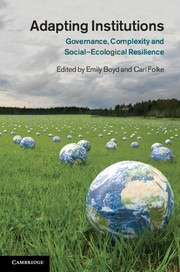Book contents
- Frontmatter
- Contents
- Illustrations
- Contributors
- Foreword
- Acknowledgements
- Acronyms and abbreviations
- 1 Adapting institutions, adaptive governance and complexity: an introduction
- Part I Adapting local institutions, networks, leadership and learning
- 2 Knowledge, social networks and leadership: setting the stage for the development of adaptive institutions?
- 3 Adaptive capacity of local indigenous institutions: the case of the taboo forests of southern Madagascar
- 4 Adapting to change: tracing farmers’ responses to disturbances in irrigation systems in Nepal
- 5 Creating incentives for increased public engagement in ecosystem management through urban commons
- Part II Adapting and governing public institutions for uncertainty and complexity
- Part III Adapting multi-level institutions to environmental crisis
- Index
- References
4 - Adapting to change: tracing farmers’ responses to disturbances in irrigation systems in Nepal
from Part I - Adapting local institutions, networks, leadership and learning
Published online by Cambridge University Press: 05 November 2011
- Frontmatter
- Contents
- Illustrations
- Contributors
- Foreword
- Acknowledgements
- Acronyms and abbreviations
- 1 Adapting institutions, adaptive governance and complexity: an introduction
- Part I Adapting local institutions, networks, leadership and learning
- 2 Knowledge, social networks and leadership: setting the stage for the development of adaptive institutions?
- 3 Adaptive capacity of local indigenous institutions: the case of the taboo forests of southern Madagascar
- 4 Adapting to change: tracing farmers’ responses to disturbances in irrigation systems in Nepal
- 5 Creating incentives for increased public engagement in ecosystem management through urban commons
- Part II Adapting and governing public institutions for uncertainty and complexity
- Part III Adapting multi-level institutions to environmental crisis
- Index
- References
Summary
Introduction
This chapter takes the analysis of common-pool resource management one step further by looking closely at how users adapt to disturbances. Using data from farmer-managed irrigation systems in Nepal, the processes triggered by disturbances are traced and the actions taken by the users to counter them identified. These actions, highly consistent over time and space, can be grouped into decision-making, reconstruction activities, rule-changing, conflict management, change of leadership and more extensive changes in institutional structure. Many of the activities are undertaken or initiated by leaders. The disturbances that lead to the most extensive change are those that alter user-group composition or directly affect the institutional structure. The analysis provides insights regarding how to analyse and promote adaptability in social–ecological systems. The most important conclusion is perhaps that we need to broaden our theoretical horizon if we are to fully understand how people adjust to change in social–ecological systems.
The analysis takes us inside the social side of the system and looks at what the users do to adapt to disturbances. I follow the processes triggered by different kinds of disturbances in irrigation systems in Nepal and trace the ways the farmers have acted to adapt to them. While providing insights into the reality of resilience and adaptation, the chapter also contributes to the literature on common-pool resource management. The irrigation systems under study are farmer-managed, that is, managed and in most cases constructed by the farmers themselves. As such, they are examples of common-pool resources (CPRs), defined as natural or human-made resources with indivisibility in the resource stock but subtractability in the resource yields and combined with limited entry (Ostrom 1990). The fact that a substantial part of the poor in developing countries depend on common-pool resources for their livelihood is proof that users are able to manage them in a sustainable way.
- Type
- Chapter
- Information
- Adapting InstitutionsGovernance, Complexity and Social-Ecological Resilience, pp. 75 - 100Publisher: Cambridge University PressPrint publication year: 2011
References
- 1
- Cited by



